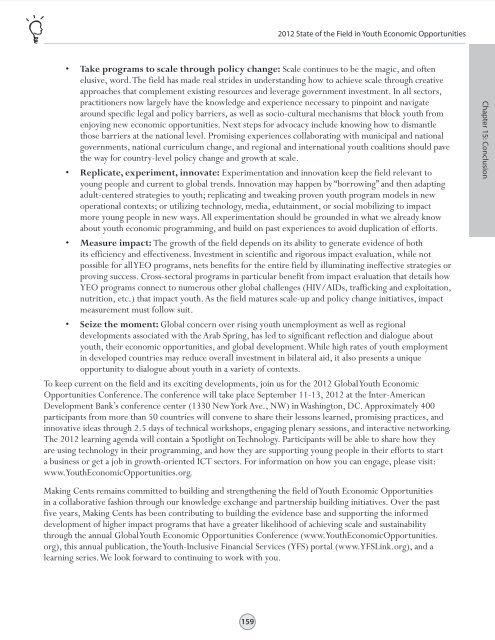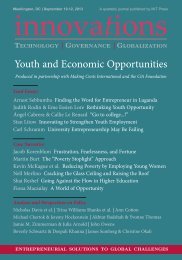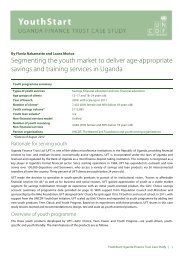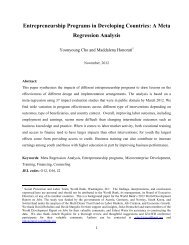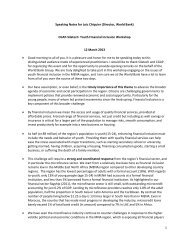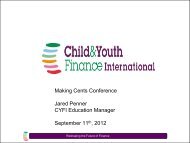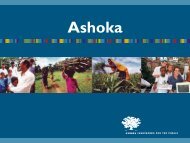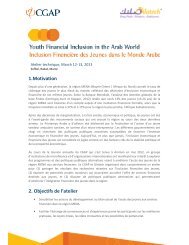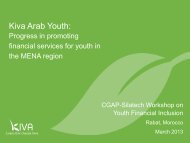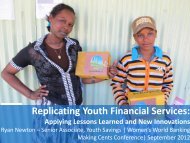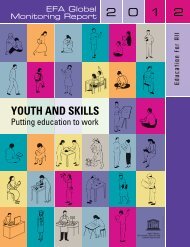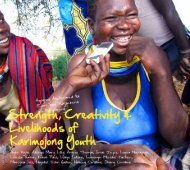STATE OF THE FIELD IN YOUTH ECONOMIC OPPORTUNITIES
STATE OF THE FIELD IN YOUTH ECONOMIC OPPORTUNITIES
STATE OF THE FIELD IN YOUTH ECONOMIC OPPORTUNITIES
You also want an ePaper? Increase the reach of your titles
YUMPU automatically turns print PDFs into web optimized ePapers that Google loves.
Table of Contents<br />
Chapter 9<br />
Chapter 1 Chapter 2 Chapter 3 Chapter 4 Chapter 5 Chapter 6 Chapter 7 Chapter 8<br />
Chapter 10 Chapter 11 Chapter 12 Chapter 13 Chapter 14 Chapter 15 Annexes<br />
2012 State of the Field in Youth Economic Opportunities<br />
• Take programs to scale through policy change: Scale continues to be the magic, and often<br />
elusive, word. The field has made real strides in understanding how to achieve scale through creative<br />
approaches that complement existing resources and leverage government investment. In all sectors,<br />
practitioners now largely have the knowledge and experience necessary to pinpoint and navigate<br />
around specific legal and policy barriers, as well as socio-cultural mechanisms that block youth from<br />
enjoying new economic opportunities. Next steps for advocacy include knowing how to dismantle<br />
those barriers at the national level. Promising experiences collaborating with municipal and national<br />
governments, national curriculum change, and regional and international youth coalitions should pave<br />
the way for country-level policy change and growth at scale.<br />
• Replicate, experiment, innovate: Experimentation and innovation keep the field relevant to<br />
young people and current to global trends. Innovation may happen by “borrowing” and then adapting<br />
adult-centered strategies to youth; replicating and tweaking proven youth program models in new<br />
operational contexts; or utilizing technology, media, edutainment, or social mobilizing to impact<br />
more young people in new ways. All experimentation should be grounded in what we already know<br />
about youth economic programming, and build on past experiences to avoid duplication of efforts.<br />
• Measure impact: The growth of the field depends on its ability to generate evidence of both<br />
its efficiency and effectiveness. Investment in scientific and rigorous impact evaluation, while not<br />
possible for all YEO programs, nets benefits for the entire field by illuminating ineffective strategies or<br />
proving success. Cross-sectoral programs in particular benefit from impact evaluation that details how<br />
YEO programs connect to numerous other global challenges (HIV/AIDs, trafficking and exploitation,<br />
nutrition, etc.) that impact youth. As the field matures scale-up and policy change initiatives, impact<br />
measurement must follow suit.<br />
• Seize the moment: Global concern over rising youth unemployment as well as regional<br />
developments associated with the Arab Spring, has led to significant reflection and dialogue about<br />
youth, their economic opportunities, and global development. While high rates of youth employment<br />
in developed countries may reduce overall investment in bilateral aid, it also presents a unique<br />
opportunity to dialogue about youth in a variety of contexts.<br />
To keep current on the field and its exciting developments, join us for the 2012 Global Youth Economic<br />
Opportunities Conference. The conference will take place September 11-13, 2012 at the Inter-American<br />
Development Bank’s conference center (1330 New York Ave., NW) in Washington, DC. Approximately 400<br />
participants from more than 50 countries will convene to share their lessons learned, promising practices, and<br />
innovative ideas through 2.5 days of technical workshops, engaging plenary sessions, and interactive networking.<br />
The 2012 learning agenda will contain a Spotlight on Technology. Participants will be able to share how they<br />
are using technology in their programming, and how they are supporting young people in their efforts to start<br />
a business or get a job in growth-oriented ICT sectors. For information on how you can engage, please visit:<br />
www.YouthEconomicOpportunities.org.<br />
Chapter 15: Conclusion<br />
Making Cents remains committed to building and strengthening the field of Youth Economic Opportunities<br />
in a collaborative fashion through our knowledge exchange and partnership building initiatives. Over the past<br />
five years, Making Cents has been contributing to building the evidence base and supporting the informed<br />
development of higher impact programs that have a greater likelihood of achieving scale and sustainability<br />
through the annual Global Youth Economic Opportunities Conference (www.YouthEconomicOpportunities.<br />
org), this annual publication, the Youth-Inclusive Financial Services (YFS) portal (www.YFSLink.org), and a<br />
learning series. We look forward to continuing to work with you.<br />
159


